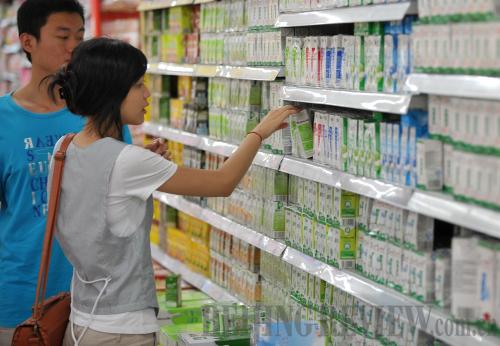|
 |
|
HARD TO CHOOSE: The Mengniu scandal is expected to taint the dairy maker's reputation and cast yet another shadow over the country's dairy industry (GUO CHENG) |
Mengniu, with the 2008 milk contamination incident still fresh in people's memories, has brought China's dairy industry into the spotlight again—this time the attention focused on a bitter rivalry.
Police in Hohhot, capital of the Inner Mongolian Autonomous Region, held a press briefing on October 22 over a Mengniu-initiated smear campaign against its rival, Yili.
Police said An Yong, a product manager of Mengniu's liquid milk department, worked with a Beijing public relations agency in July to spread accusations on the Internet that an element called fish oil docosahexaenoic acid (DHA) contained in Yili's QQ Star Children's Milk was harmful to consumers. Four suspects including An have been detained, and another two suspects remain at large.
The briefing was believed to have helped dismiss worries about Yili products, though it will take time for consumer confidence to recover.
Malicious competition
Yili and Mengniu, both headquartered in Hohhot, are the top two companies in China's dairy industry. They have reportedly been competing in most aspects of their business operations, from raw milk sources to distribution channels.
Founded in August 1999, Mengniu, with total assets exceeding 14.1 billion yuan ($2.1 billion), has an annual dairy production capacity of 6 million tons and nearly 30,000 employees. In recent years it has witnessed rapid growth and expanded its presence across China. Mengniu's products are now exported to a number of countries, the United States and Canada included.
In the first half of this year, Mengniu topped all competitors to rake in net profits of 618.8 million yuan ($92.4 million), followed by Yili's 345 million yuan ($51.5 million).
While Mengniu led the liquid milk market, Yili kept the top position in milk powder. But the competition heated up when both made forays into infant milk production.
In 2006, Yili's latest product QQ Children's Milk became a market hit. Mengniu followed suit by releasing its Star of Future Children's Milk in 2008. The two products bore significant resemblances, but in terms of market share, Yili enjoyed evident advantages.
An's online attack was aimed at devastating the rival product's reputation and driving up Mengniu's sales.
The Hohhot police confirmed that An hired the Beijing Bosse PR Consulting Co. Ltd. to plot the online sabotage. On its official website, the PR company called itself a think tank of Mengniu, and stressed it provided important consultant support for Mengniu on its path of fast expansion.
The police revealed that Bosse's deputy general manager Xiao Xuemei and three other employees jointly hammered out a plan to maliciously attack Yili's reputation. The DHA element was an easy target, since it helps infant brain development. Mengniu would also be able to differentiate itself since Yili's DHA comes from fish oil and Mengniu's from algal oil. The libel campaign focused on allegations that DHA from sea fish could lead to premature sexual development and that DHA from algal oil was much safer.
| 